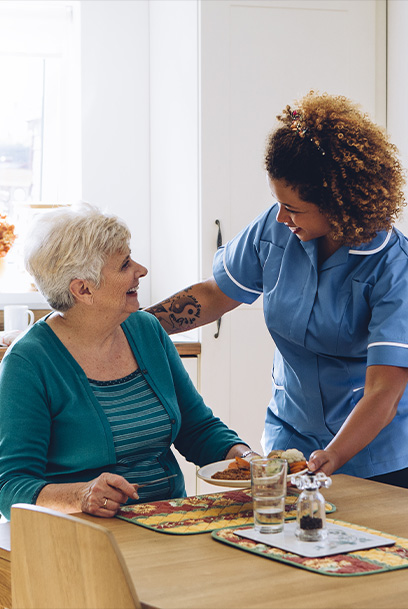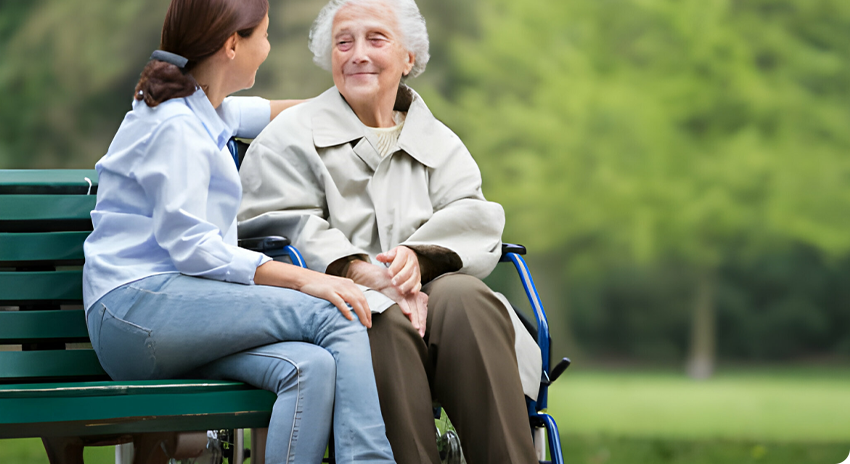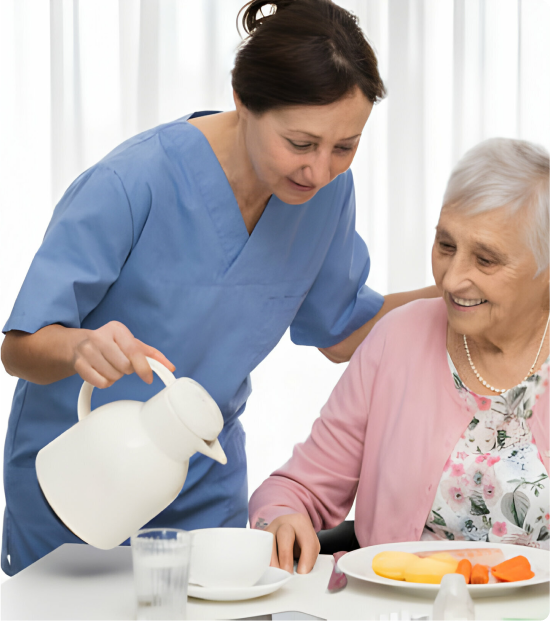This website uses cookies so that we can provide you with the best user experience possible. Cookie information is stored in your browser and performs functions such as recognising you when you return to our website and helping our team to understand which sections of the website you find most interesting and useful.
Home Care In Outwater, NC

They say that your golden years are the best years of your life. For most older Americans, that's how it should be - a time to relax, reflect, and live life in a familiar place. After all, senior citizens in the U.S. have worked tirelessly to build a better economy, serve their communities, and raise families.
Unfortunately, many older Americans aren't able to rely on their adult children for help. The reality in today's world is that family members do not have the skills or time to dedicate to caring for their parents. That's where Always Best Care Senior Services comes in.
Our in-home care services are for people who prefer to stay at home as they grow older but need ongoing care that family or friends cannot provide. More and more older adults prefer to live far away from long-term, institutionalized facilities and closer to the place where they feel most comfortable - their home. Home care in Outwater, NC is a safe, effective way to give your loved ones the care they need when they need it the most.

 Home Care Services
Home Care Services
- Home Care in Outwater, NC
- The Always Best Care Difference
- Types of In-home Care in Outwater, NC
- Benefits of Home Care in Outwater, NC
- Aging in Place: The Preferred Choice for Most Seniors
- Affordable Care Plans
- Compassionate Care. Trusted Caregivers
- Assisted Living Referral Services
- Taking the First Step with Always Best Care
 Service Areas
Service Areas
The Always Best Care Difference
Since 1996, Always Best Care has provided non-medical in-home care for seniors to help them maintain a healthy lifestyle as they get older. We are proud to have helped more than 25,000 seniors maintain higher levels of dignity and respect. We focus on providing seniors with the highest level of in-home care available so that they may live happily and independently.
Unlike some senior care companies, we genuinely want to be included in our clients' lives. We believe that personalized care is always the better option over a "one size fits all" approach. To make sure our senior clients receive the best care possible, we pair them with compassionate caregivers who understand their unique needs. That way, they may provide care accordingly without compromising their wellbeing.
The Always Best Care difference lies in life's little moments - where compassionate care and trustworthy experience come together to help seniors live a fruitful, healthy life. Whether you are an aging adult that can't quite keep up with life's daily tasks or the child of a senior who needs regular in-home services, Always Best Care is here to help.
“Such a wonderful place to work! Caregivers that genuinely care with office support that go”
“I bn with this company for Abt a year and I love working for them”
“I cannot say enough good things about this company and the caregivers they provided after”
“This company is TOP-NOTCH! Incredibly helpful and super friendly. If you’re looking for a part-time”
“Sandy is very knowledgeable of assisted living options in the Winston Salem area. She helped”
“I highly recommend Sandy Bowen with Always Best Care. I called her with a very”
“The staff and caretakers are wonderful. Would absolutely recommend to anyone who needs at home”
“These folks are so helpful! They care about their clients and it shows in the”
“The staff and caretakers are wonderful. Would absolutely recommend to anyone who needs at home”
“During an unexpected hospital stay, Joanne provided much needed assistance. She provided excellent care and”
“If you are looking for attentive, quality home care look no further than Joanne and”
“Such a wonderful place to work! Caregivers that genuinely care with office support that go above and beyond for staff/clients. Highly recommend for employment and senior in-home care support.”
“I bn with this company for Abt a year and I love working for them . They work with you,they care about ur personal life/ problems, really good at matching you with good clients..”
“I cannot say enough good things about this company and the caregivers they provided after my mom's recent accident and stay in a rehab facility. The staff were constantly in communication with us keeping us abreast of any little or big updates. Their attitudes were always helpful and they seemed to genuinely care. The caregivers they sent to sit with and take care of mom were EXCELLENT. I'm not sure how many different caregivers she had over the few weeks of her stay but there wasn't a single one that wasn't kind and extremely helpful. It took a tremendous load off of everyone in our family knowing that she was being well cared for when we couldn't be there. Thank you to Brandi, Joanne, Gina, and anyone I'm missing for everything you all did for us from the beginning of the process all the way to my mom's release today. Hopefully, we won't need your services again, but if we do, I know who I will be calling!”
“This company is TOP-NOTCH! Incredibly helpful and super friendly. If you’re looking for a part-time in caregiving, this is it! ⭐️⭐️⭐️⭐️⭐️”
“Sandy is very knowledgeable of assisted living options in the Winston Salem area. She helped with a family member’s search with care and consideration. We highly recommend.”
“I highly recommend Sandy Bowen with Always Best Care. I called her with a very tight timeframe to find a suitable memory care facility for my family member. She asked a lot of questions about my loved one to try and get to know her as much as possible. She worked very fast and lined up several appointments for us to tour places within a matter of days. She explained the process to me every step of the way and made sure we stayed on track. She attended the appointments with me and asked questions that I would never think to ask. I can’t thank her enough.”
“The staff and caretakers are wonderful. Would absolutely recommend to anyone who needs at home care for themselves or loved ones”
“These folks are so helpful! They care about their clients and it shows in the service! I highly recommend ????”
“The staff and caretakers are wonderful. Would absolutely recommend to anyone who needs at home care for themselves or loved ones”
“During an unexpected hospital stay, Joanne provided much needed assistance. She provided excellent care and supportive advocacy. It made dealing with the discomfort more bearable and gave me a safeguard to decipher the complicated choices to resolve health issues. I highly recommend this service.”
“If you are looking for attentive, quality home care look no further than Joanne and her team. A passion for excellence is driven for from this team. Family oriented and willing to work with all families.”
What is Non-Medical Senior Care in Outwater, NC?

Home is where the heart is. While that saying can sound a tad cliche, it is especially true for many seniors living in America. When given a choice, older adults most often prefer to grow older at home. An AARP study found that three out of four adults over the age of 50 want to stay in their homes and communities as they age.

When you begin to think about why, it makes sense. Home offers a sense of security, comfort, and familiarity.

The truth is, as we age, we begin to rely on others for help. When a family is too busy or lives too far away to fulfill this role, in-home senior care is often the best solution. Home care services allow seniors to enjoy personal independence while also receiving trustworthy assistance from a trained caregiver.

At Always Best Care, we offer a comprehensive range of home care services to help seniors stay healthy while they get the help they need to remain independent. As your senior loved one gets older, giving them the gift of senior care is one of the best ways to show your love, even if you live far away.

Types of Elderly Care in Outwater, NC
To give our senior clients the best care possible, we offer a full spectrum of in-home care services:

Personal Care Services
If your senior loved one has specific care needs, our personal care services are a great choice to consider. Personal care includes the standard caregiving duties associated with companion care and includes help with tasks such as dressing and grooming. Personal care can also help individuals with chronic conditions like diabetes.
Common personal care services include assistance with:
- Eating
- Mobility Issues
- Incontinence
- Bathing
- Dressing
- Grooming


Home Helper Services
Sometimes, seniors need helpful reminders to maintain a high quality of life at home. If you or your senior has trouble with everyday tasks like cooking, our home helper services will be very beneficial.
Common home helper care services include assistance with:
- Medication Reminders
- Meal Preparation
- Pet Care
- Prescription Refills
- Morning Wake-Up
- Walking
- Reading


Companionship Services
Using this kind of care is a fantastic way to make life easier for you or your senior loved one. At Always Best Care, our talented caregivers often fill the role of a companion for seniors.
Common companionship services include:
- Grocery Shopping
- Transportation to Appointments
- Nutritional Assistance
- Conversation
- Planning Outings
- Completing Errands
- Transportation to Community
- Events and Social Outings


Respite Care Services
According to AARP, more than 53 million adults living in the U.S. provide care to someone over 50 years old. Unfortunately, these caregivers experience stress, exhaustion, and even depression. Our respite care services help family caregivers address urgent obligations, spend time with their children, and enjoy nearby activities. Perhaps more importantly, respite care gives family members time to recharge and regroup. Taking personal time to de-stress reduces the risk of caregiver burnout. Doing so is great for both you and your loved one.
At the end of the day, our goal is to become a valuable part of your senior's daily routine. That way, we may help give them the highest quality of life possible. We know that staying at home is important for your loved one, and we are here to help make sure that is possible.
If you have been on the fence about non-medical home care, there has never been a better time than now to give your senior the care, assistance, and companionship they deserve.

Benefits of Home Care in Outwater, NC
Always Best Care in-home services are for older adults who prefer to stay at home but need ongoing care that friends and family cannot provide. In-home care is a safe, effective way for seniors to age gracefully in a familiar place and live independent, non-institutionalized lives. The benefits of non-medical home care are numerous. Here are just a few reasons to consider senior care services from Always Best Care:
Always Best Care offers a full array of care options for patients at all levels of health. With our trusted elderly care services, your loved one will receive the level of care necessary for them to enjoy the highest possible quality of life.
Request More Information
Aging in Place: The Preferred Choice for Most Seniors
While it's true that some seniors have complicated medical needs that prevent them from staying at home, aging in place is often the best arrangement for seniors and their families. With a trusted caregiver, seniors have the opportunity to live with a sense of dignity and do so as they see fit - something that is unavailable to many older people today.
In-home care makes it possible for millions of seniors to age in place every year. Rather than moving to a strange nursing home, seniors have the chance to stay at home where they feel the happiest and most comfortable.
Here are just a few of the reasons why older men and women prefer to age at home:
How much does a senior's home truly mean to them?
A study published by the American Society on Aging found that more than half of seniors say their home's emotional value means more than how much their home is worth in monetary value. It stands to reason, then, that a senior's home is where they want to grow old.
With the help of elderly care in Outwater, NC, seniors don't have to age in a sterilized care facility. Instead, they can age gracefully in the place they want to be most: their home. In contrast, seniors who move to a long-term care facility must adapt to new environments, new people, and new systems that the facility implements. At this stage in life, this kind of drastic change can be more harmful than helpful.
Institutional care facilities like nursing homes often put large groups of people together to live in one location. On any given day, dozens of staff members and caregivers run in and out of these facilities. Being around so many new people in a relatively small living environment can be dangerous for a seniors' health and wellbeing. When you consider that thousands of seniors passed away in nursing homes during the COVID-19 pandemic, opting for in-home care is often a safer, healthier choice for seniors.
Aging in place has been shown to improve seniors' quality of life, which helps boost physical health and also helps insulate them from viral and bacterial risks found in elderly living facilities.
For many seniors, the ability to live independently with assistance from a caregiver is a priceless option. With in-home care, seniors experience a higher level of independence and freedom - much more so than in other settings like a nursing home. When a senior has the chance to age in place, they get to live life on their own terms, inside the house that they helped make into a home. More independence means more control over their personal lives, too, which leads to increased levels of fulfillment, happiness, and personal gratification. Over time, these positive feelings can manifest into a healthier, longer life.
More independence, a healthier life, and increased comfort are only a few benefits of aging in place. You have to take into consideration the role of cost and convenience. Simply put, it's usually easier and more affordable to help seniors age in place than it is to move them into an institutional care facility. According to the US Department of Housing and Urban Development, seniors who age in the comfort of their homes can save thousands of dollars per month.
In-home care services from Always Best Care, for instance, are often less expensive than long-term solutions, which can cost upwards of six figures per year. To make matters worse, many residential care facilities are reluctant to accept long-term care insurance and other types of payment assistance.
With Always Best Care's home care services, seniors and their families have a greater level of control over their care plans. In-home care gives seniors the chance to form a bond with a trusted caregiver and also receive unmatched care that is catered to their needs. In long-term care facilities, seniors and their loved ones have much less control over their care plan and have less of a say in who provides their care.

Affordable Care
In-home care is a valuable resource that empowers seniors to age in place on their own terms. However, a big concern for many families and their loved ones is how much in-home care costs. If you're worried that in-home care is too expensive, you may be pleasantly surprised to learn that it is one of the most affordable senior care arrangements available.
Typically, hiring an Always Best Care in-home caregiver for a few hours a week is more affordable than sending your loved one to a long-term care facility. This is true even for seniors with more complex care needs.
At Always Best Care, we will work closely with you and your family to develop a Care Plan that not only meets your care needs, but your budget requirements, too. Once we discover the level of care that you or your senior need, we develop an in-home care plan that you can afford.
In addition to our flexible care options, families should also consider the following resources to help offset potential home care costs:

Compassionate Care. Trusted Caregivers.
When you or your senior loved one needs assistance managing daily tasks at home, finding a qualified caregiver can be challenging. It takes a special kind of person to provide reliable care for your senior loved one. However, a caregiver's role involves more than meal preparation and medication reminders. Many seniors rely on their caregivers for companionship, too.
Our companion care services give seniors the chance to socialize in a safe environment and engage in activities at home. These important efforts boost morale and provide much-needed relief from repetitive daily routines. A one-on-one, engaging conversation can sharpen seniors' minds and give them something in which to be excited.
At Always Best Care, we only hire care providers that we would trust to care for our own loved ones. Our senior caregivers in Outwater, NC understand how important it is to listen and communicate with their seniors. A seemingly small interaction, like a short hug goodbye, can make a major difference in a senior's day. Instead of battling against feelings of isolation, seniors begin to look forward to seeing their caregiver each week.
Understanding the nuances of senior care is just one of the reasons why our care providers are so great at their job.
Unlike some senior care companies, our caregivers must undergo extensive training before they work for Always Best Care. In addition, our caregivers receive ongoing training throughout the year. This training ensures that their standard of care matches up to the high standards we've come to expect. During this training, they will brush up on their communication skills, safety awareness, and symptom spotting. That way, your loved one receives the highest level of non-medical home care from day one.
Assisted Living Referral Services
While it's true that many seniors prefer to age at home, sometimes in-home care isn't the best fit. For those seniors and their families, choosing an assisted living facility makes more sense. Unfortunately, finding the optimal care facility is easier said than done in today's day and age. That's when Always Best Care's assisted living referral services begin to make a lot of sense.
Assisted living is a form of housing intended for seniors who require varying degrees of medical and personal attention. Accommodations may include single rooms, apartments, or shared living arrangements. Assisted living communities are typically designed to resemble a home-like environment and are physically constructed to encourage the independence of residents.

At assisted living communities, seniors receive help with daily activities such as bathing, dressing, and eating. They may also benefit from coordination of services with outside healthcare providers, and monitoring of resident activities to ensure their health, safety, and well-being. Caregivers who work at assisted living communities can also provide medication administration and personal care services for older adults.
Other services offered within assisted living communities can include some or all of the following:
- Housekeeping
- Laundry
- Recreational Activities
- Social Outings
- Emergency Medical Response
- Medication Monitoring
- Family Visitation
- Personal Care

At Always Best Care, our representatives can match your senior's emotional, physical, and financial needs with viable assisted living communities nearby. Results are based on comparative data, so you can select the best choice for you or your loved one.
Always Best Care works closely with local senior living communities to gain valuable knowledge that we then use to help seniors and their loved ones make informed decisions. This information can include basic care and rent, resident availability, and services provided. Because Always Best Care is compensated by these communities, we provide senior living referral services at no extra cost to you.

For many seniors, moving into a senior living community revolves around how and when they want to make a transition to more involved care. Some seniors are more proactive about transitioning to independent living. Others choose to remain home until their care needs or other requirements are satisfied. Remember - our staff is here to help. Contact our office today to learn more about assisted living communities and how we can find a facility that exceeds your expectations.

Taking the First Step with Always Best Care
The first step in getting quality in-home care starts with a personal consultation with an experienced Always Best Care Care Coordinator. This initial consultation is crucial for our team to learn more about you or your elderly loved one to discover the level of care required. Topics of this consultation typically include:
A discussion of your needs and how our trained caregivers can offer assistance in the most effective way

A draft of your care plan, which includes highly detailed notes and a framework for the care that you or your senior will receive

Discuss payment options and help coordinate billing with your insurance provider

Our caregivers are trained to spot changes that clients exhibit, like mental and physical decline. As your trusted senior care company, we will constantly assess and update your Care Plan to meet any new emotional, intellectual, physical, and emotional needs.
If you have never considered in-home care before, we understand that you and your family may have concerns about your Care Plan and its Care Coordinator. To help give you peace of mind, know that every team member and caregiver must undergo comprehensive training before being assigned to a Care Plan.
At the end of the day, we only hire the best of the best at Always Best Care. Whether you need home care in Outwater, NC 24-hours a day or only need a respite for a couple of hours, we are here to serve you.
When you're ready, we encourage you to contact your local Always Best Care representative to set up a Care Consultation. Our Care Coordinators would be happy to meet with you in person to get to know you better, discuss your needs, and help put together a personalized Care Plan specific to your needs.

Latest News in Outwater, NC
Lights out, water off, West Asheville bar still served neighbors after Helene devastation
Sarah Honoskyhttps://www.citizen-times.com/story/news/local/2024/10/02/asheville-bar-neighbors-fill-aid-gaps-of-helene-devastation/75446123007/
ASHEVILLE - In no-frills neighborhood bar, The Odd, they were in the dark, slinging food hot off of gas grills. A line meandered out the door and past the wooden fence that demarcates the patio of the West Asheville hangout. It was pay-what-you-can, or nothing at all, once you reached the front of the queue."A lot of people are hurting," said Ben Hester, among those cooking in the close, warm kitchen of the bar on Sept. 29. He introduced himself as "Big Daddy Chef.""We're just trying to m...
ASHEVILLE - In no-frills neighborhood bar, The Odd, they were in the dark, slinging food hot off of gas grills. A line meandered out the door and past the wooden fence that demarcates the patio of the West Asheville hangout. It was pay-what-you-can, or nothing at all, once you reached the front of the queue.
"A lot of people are hurting," said Ben Hester, among those cooking in the close, warm kitchen of the bar on Sept. 29. He introduced himself as "Big Daddy Chef."
"We're just trying to make sure that everybody eats, nobody goes hungry."
They had freezers full of food, co-owner Amy Marshall reasoned. It's going bad: "Let's cook it all."
It was two days after Tropical Storm Helene and the lights were still out. The power company, Duke Energy, cautioned it might be until the end of the week for some areas to be restored. For water, the outlook was even more grim. Officials said restoring service to the full system could take weeks.
'Grassroots organizing' fills gaps
But in neighborhoods like West Asheville, in the days before federal aid would reach the promised Buncombe County distribution sites, communities were organizing.
Marshall said it's not uncommon to see people walking up her West Asheville street carrying sloshing 5-gallon buckets, having come to scoop water from her pool, desperate for a way to flush toilets.
Behind the counter of The Odd's darkened kitchen, Mercy Beveridge was slicing bread, doling spoonfuls of eggs and cheese into Styrofoam clamshells. The day before, Marshall said they served over 500 people. Then, it was standard bar fare, clearing out the stock item by item: fries, burgers, philly cheese steaks. She brought bags of mozzarella sticks to people waiting in line.
"It's what The Odd represents," Marshall said.
Even if you don't need food, you came to be with people.
“I think it’s notable that (Federal Emergency Management Agency) is not here yet, and there is sort of a resilience and a nimbleness to people helping each other out," said Libertie Valance Sept. 29. Valance was standing across the street outside Firestorm, West Asheville's collectively-owned, radical bookstore, where they are among the collective members and worker/owners at the 15-year-old cooperative.
"Even if we do live in a world right now where we are reliant on the big nonprofits and government agencies to carry a lot of weight, we know that volunteer, grassroots organizing is what can fill the gap and save lives in the interim.”
At the bookstore, Valance pointed to the "giant ecosystem" of resource sharing: Food moving from Sunny Point Cafe? to 12 Baskets, then the leftovers to a table outside Firestorm, where beef tacos were up for grabs. Sanitary supplies like diapers and tampons were stacked nearby, delivered by people from South Carolina, part of a mutual aid disaster relief network, Valance said.
“It’s just been like a series of things being worse than I, or the people around me, thought they were going to be. And so each day has felt like an unwelcome novelty," they said.
“I think the silver lining on that is just from literally the first second, and really before it even started, there were people that we knew and we were seeing organize themselves."
It was more than resources — households, friends and neighbors were creating new rituals, new means of communication with cell service still limited, or nonexistent. For some, it was elaborate note systems. For others, a whiteboard in a shared hallway.
“I definitely get a sense of people offering what they have and speaking up when they need things,” said Ben Stockdale, who had found his way to a West Asheville fire station in search of cell service.
Some neighborhoods set times to meet each evening or morning, or gathered to listen to the latest emergency briefings, broadcast from a car radio, windows rolled down and doors open. Firestorm has been holding community meetings each day at 2 p.m.
'It's all gone'
In Montford, taped to a fence in Chestnut Street, news updates and tips were posted daily. A charging station was set up, extension cord running back into the house.
It was there that Madeline Varney paused on her bike to peruse the postings. She had a milk crate of groceries attached to the back.
In those first days, Valance had pointed out earlier, people found the best way to learn about stocked grocery stores or working gas pumps was word of mouth. You pass someone with groceries? Ask them where they got it.
In this case, Varney said, it was at the Whole Foods off Merrimon Avenue. It was a two hour line, but she snagged juice and La Croix, having been spurned by a picked-over water section, and hygienic supplies for older neighbors in her building, who she said, like others, are "banding together."
But while Varney said she was getting by in North Asheville, less hard-hit than other areas of the city — though her house was grazed by two huge maple trees that fell during the storm — it was her family she was more worried for.
"My folks are in Spruce Pine," she said. "It's decimated."
While she agreed she's also seeing the community gathering, "I’m just worried about two weeks from now, when people don’t have water and gas, and you can’t really get out," Varney said.
"That’s what makes me claustrophobic. And I can’t go anywhere towards my family. It’s all gone.”
'Support between neighbors'
For Amy Cantrell and Ponkho Bermejo, the search for resources had meant driving backroads south to Easley, South Carolina, where Bermejo said they spent thousands of dollars filling cars with food, drinks and needed supplies.
The night of Sept. 29, they were making their way back north, with stops to deliver aid planned in Hendersonville, Sweeten Creek and Candler, finishing up overnight in Swannanoa, where Fire Chief Anthony Penland described the damage as "total devastation."
More:Helene in Swannanoa: 'Devastation' brings 'nightmares' for residents
"We're safe," Cantrell told the Citizen Times over a staticky phone connection. But of what they've seen on the ground, "you can't even put words to it. It's so horrific."
"We have seen a lot of pain," Bermejo said. But they have also "seen a lot of support between neighbors. We hear a lot of stories of people who don’t have a lot, only they offer something to their neighbor," because they know the only way to survive this situation is to help the people who live beside you, he said.
More:More than 12,000 requests for help: Volunteers search for missing people after Helene
More:'A warzone:' Asheville Mayor talks Helene; Water restoration could be weeks away
Sarah Honosky is the city government reporter for the Asheville Citizen Times, part of the USA TODAY Network. News Tips? Email [email protected] or message on Twitter at @slhonosky. Please support local, daily journalism with a subscription to the Citizen Times.
Please support us by turning off your adblocker.
Get unlimited digital access, along with subscriber-exclusive content, and more.
Baptists on Mission among helpers at work in Western NC after Helene devastation
Martha Quillinhttps://ca.news.yahoo.com/baptists-mission-among-helpers-western-215804013.html
Until last week, Bill White had the kind of home in Arden, just south of Asheville, that real estate agents would describe as park-like, with a lot so dense with trees it was hard to see the house from the road.Then destructive remnants of Hurricane Helene came through and did some unwelcome landscaping, dropping at least 10 mature trees, including a four-trunk oak that landed on the house.White, 86, was just about to climb onto the roof and size up the damage Monday afternoon when a trio of men from the N.C. Baptists on Missio...
Until last week, Bill White had the kind of home in Arden, just south of Asheville, that real estate agents would describe as park-like, with a lot so dense with trees it was hard to see the house from the road.
Then destructive remnants of Hurricane Helene came through and did some unwelcome landscaping, dropping at least 10 mature trees, including a four-trunk oak that landed on the house.
White, 86, was just about to climb onto the roof and size up the damage Monday afternoon when a trio of men from the N.C. Baptists on Mission pulled into his driveway and started unloading chainsaws and limb loppers.
“This is unbelievable,” White kept saying, his sea-blue eyes filling with tears. “It’s unbelievable that they do this.”
Craig Schomburg, John Miller and Mark Cantrell have been doing this together for years. They know each other from Apex Baptist Church, and now that they’re retired, they have the time to travel to the places where people are the most relieved to see them.
Between them, they have done disaster relief in several states, and regularly volunteer at the Baptist on Mission’s Rose Hill outpost, where workers still are rebuilding homes lost in Hurricane Florence n 2018.
This week, they’re working with teams based at Biltmore Baptist Church, where several disaster-relief efforts have converged in response to the widespread need Helene created.
The Baptists have set up two of their mass-feeding kitchens behind the church and have been preparing meals for students and faculty at UNC-Asheville, a nursing home in Asheville and some of the shelters around Buncombe County where people are staying-because their homes are uninhabitable.
Feed the Hunger has delivered thousands of bags of pre-mixed rice and pasta meals that church volunteers were giving away Monday along with donated bags of ice and cases of water. Inside the church more volunteers were sorting gifts of baby diapers, formula and other items displaced residents will need.
Drinking water has been an urgent need since the storm. The city of Asheville had to shut off water to make repairs to its system and those on wells in rural communities need electricity to power pumps.
Biltmore Baptist’s pastor, Jason Gaston, who used to serve Raleigh’s Summit Church, has been working with Raleigh sources to bring in some of the water and other supplies. Monday afternoon, a line of cars wrapped around Biltmore Baptist’s parking lot as residents rolled through and volunteers placed the items in their trunks or back seats.
The campus bustled with the work of more than 100 volunteers Monday.
“Hope showed up today,” Gaston said. “Hope has been here, of course, but hope showed up tangibly for our community today.”
Watching the chainsaw crew work in his yard a few miles away, Bill White agreed.
“It’s here,” he said.
Disclaimer:


 336-654-5001
336-654-5001





